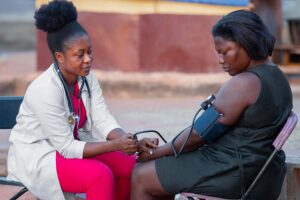When it comes to saving lives, few things are as crucial as blood donation. But did you know that your blood group plays a vital role in determining who can safely receive your donation? In Nigeria, understanding blood group compatibility is not just a matter of science—it’s a life-saving responsibility.
Your blood group is much more than just a label. It’s a key factor in ensuring the safe and effective transfusion of blood, plasma, platelets, and even stem cells. Blood donation is a noble act, but understanding the rhesus factor, genotype, and blood type compatibility can make all the difference in saving someone’s life.
The Vital Role of Blood Groups in Donation
Every individual’s blood group is determined by specific proteins and sugars on the surface of red blood cells. These proteins are classified into four major blood types: A, B, AB, and O, with each blood type either being Rh-positive or Rh-negative. Understanding your blood group is crucial for blood donation because it helps medical professionals determine which blood types are compatible for transfusion.
In Nigeria, blood donation rates are relatively low compared to the urgent demand for blood. Oneus in Nigeria is working tirelessly to bridge this gap by educating the public about the importance of blood donation and how knowing your blood group can make a significant difference.

Blood Compatibility: Why It Matters
Blood donation involves more than simply donating blood. When donating blood or plasma, compatibility with the recipient’s blood group is essential. If the wrong blood type is transfused, the body’s immune system may attack the foreign blood, causing severe reactions. For example, if a person with type O blood donates to someone with type A, the immune system could mount an attack on the incompatible blood cells, leading to a life-threatening situation.
Knowing your rhesus factor (whether you’re Rh-positive or Rh-negative) also plays an essential role. Incompatibility between the donor and recipient’s rhesus factor can lead to serious complications, especially in cases of pregnancy, where Rh incompatibility can result in hemolytic disease of the newborn.
The Different Types of Blood Donation: Plasma, Platelet, and Bone Marrow
Blood donation goes beyond just giving whole blood. It includes plasma donation, platelet donation, and even bone marrow donation. These types of donations are life-saving in different ways:
- Plasma Donation: Plasma is the liquid part of your blood and contains vital proteins that can help burn victims, people undergoing surgery, or those with clotting disorders. Plasma donation centers in Nigeria, such as Oneus, focus on educating the public about the need for regular plasma donations.
- Platelet Donation: Platelets are essential for blood clotting. Cancer patients, especially those undergoing chemotherapy, often require platelet transfusions. Platelet donation can be a direct way to help those in critical need.
- Bone Marrow Donation: This is another life-saving form of donation, especially for patients with blood cancers like leukemia. In Nigeria, there is a growing awareness about stem cell donation and how it can potentially cure or alleviate such diseases.
The Benefits of Blood Donation: How Giving Can Save Lives
One of the most profound ways you can give back to your community is by donating blood. In Nigeria, blood donation drives are frequently held to encourage people to donate. If you’re healthy, giving blood regularly can help sustain blood banks and hospitals, ensuring that blood is readily available for emergency situations.
For many people, the idea of selling plasma or donating blood for financial compensation may be a consideration. While it’s crucial to understand the ethical implications and medical guidelines involved, selling plasma can help individuals earn while still making a meaningful contribution to society. However, when choosing places to donate plasma, it’s important to seek out authentic and genuine plasma centers that adhere to safety standards.
Unfortunately, the consequences of not donating blood can be severe. Without enough donors, hospitals and medical centers may face shortages, which can lead to delays in urgent medical treatments, particularly during accidents, surgeries, or complications related to childbirth. As blood donation websites continue to promote the importance of blood donations, individuals are encouraged to regularly contribute to blood banks. Without your help, many patients may face life-threatening situations.
Take Action: How You Can Make a Difference
Now that you understand the critical role your blood group plays in ensuring compatibility, it’s time to take action. Blood donation is one of the easiest and most impactful ways to give back to your community.
Oneus in Nigeria makes it easy to contribute by organizing blood donation drives, providing information on private cord blood banking, plasma donation, and offering guidance on genotype and blood compatibility. Whether you’re interested in blood cord banking, stem cell donation, or donating whole blood, Oneus offers the resources and support you need to make an informed decision.
Give Blood, Save a Life – Book Your Donation Now!
If you’re ready to help save lives today, contact us at info@oneusng.com or call +234 902 168 2822. Visit Oneus Nigeria to learn more and schedule your next donation.
By donating blood, plasma, or bone marrow, you’re not just helping someone—you’re helping an entire community. Don’t wait. Give blood today.




